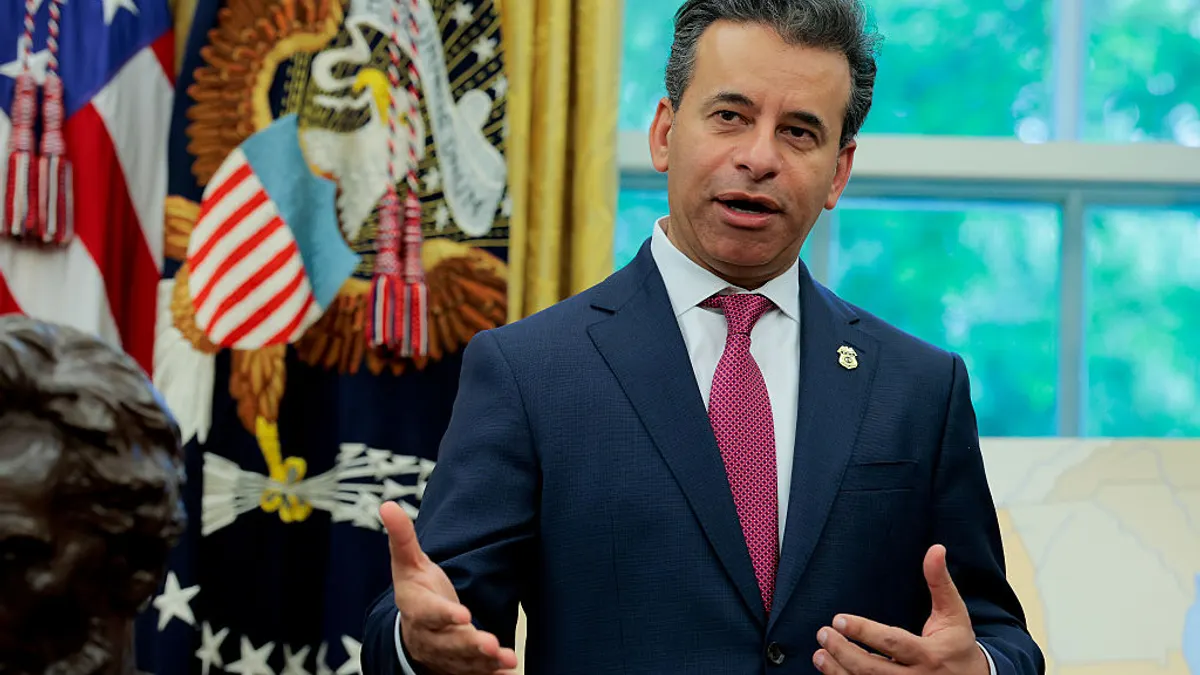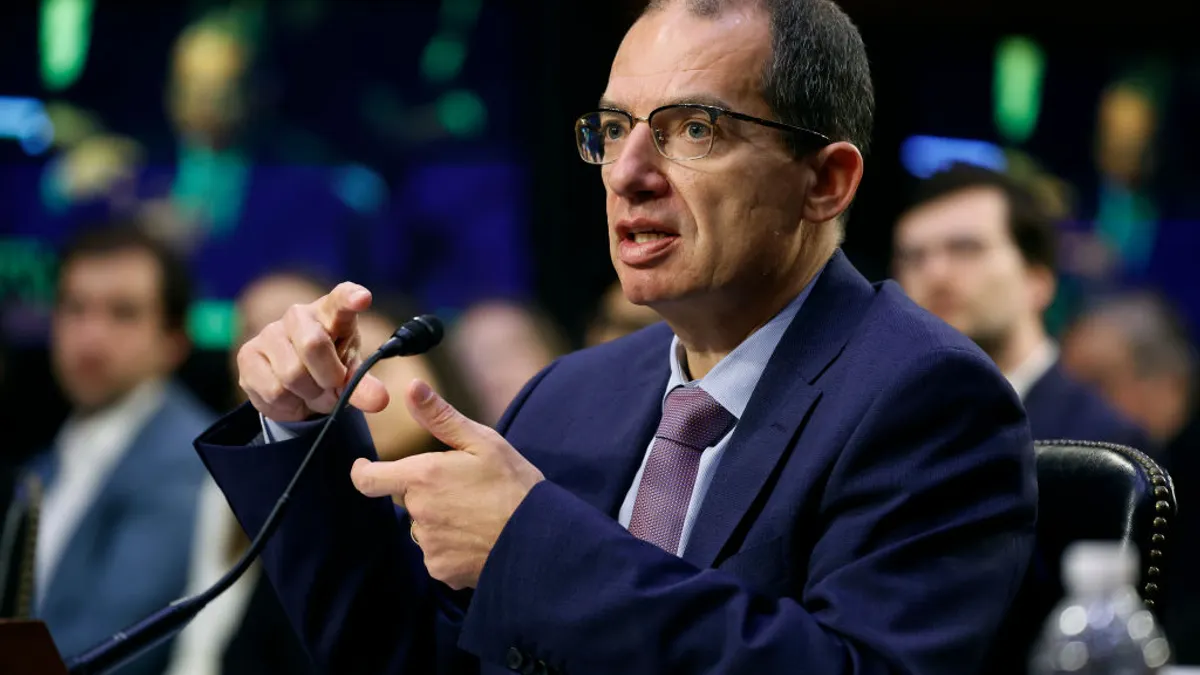While the Centers for Medicare and Medicaid Services is expected to publish the new Medicare prices of the first 10 drugs selected for the initial wave of negotiations on Sept. 1, pharma companies already know how the policy will impact their portfolios.
Negotiations officially ended Aug. 1, but the drug prices won’t go into effect until 2026. The negotiations were part of the Inflation Reduction Act, and pharma companies have been fighting the provision — without success so far — through legal actions since the law was passed.
The 10 drugs on the list were selected based on Medicare Part D expenditure and range from cardiovascular medicines to diabetes and cancer treatments. J&J is potentially the most exposed drugmaker in the first wave, though pharma leaders largely downplayed the impact of the IRA and did not disclose the new prices during earnings calls. However, other Big Pharma companies could feel the sting in the next round of drugs yet to be selected by CMS.
Here’s what pharma leaders said about how the negotiations will impact portfolios in the latest round of earnings calls.
Drug: Eliquis
Owned by: Bristol Myers Squibb and Pfizer
Eliquis’ revenue in the first half of 2024 reached $7.1 billion, making the blood thinner medication the top-selling drug for BMS, according to the company’s second-quarter earnings report. The drug, which brought in $3.9 billion in revenue for the year so far, was also the top earner for Pfizer for the first half of 2024. Despite the potential impact to revenue for both companies, BMS CEO Christopher Boerner was still bullish on the drug’s long-term success in an earning call.
“Now that we have seen the final price, we're increasingly confident in our ability to navigate the impact of [the] IRA on Eliquis. Eliquis is an important drug for patients,” Boerner said. “It's going to continue to be an important drug for the company in the short to medium term.”
While BMS may be able to weather the storm, Boerner heavily criticized the IRA’s overall impact on pharma.
“We continue to believe that arbitrary price setting by the government on life-saving medicines is not good public policy,” he said. “So irrespective of short-term dynamics, we remain very concerned about the long-term implications of IRA on innovation.”
The BMS head also stated the company has other products in the pipeline launching this year that will fill revenue gaps, including a potential blockbuster in schizophrenia drug KarXT.
Drug: Jardiance
Owned by: Eli Lilly
Jardiance is a big seller for Eli Lilly without generic competition, and the company reported the drug’s revenue hit nearly $1.5 billion during the first six months of the year, up from $1.2 billion last year.
CEO David Ricks has been vocal in his opposition to price negotiations, saying the law will harm innovation and new drug development, particularly for small molecule drugs.
“I’m really worried about the harm this will do to new cures and possibilities in medicine,” Ricks told CNBC last year.
Drug: Xarelto
Owned by: Bayer and J&J
Another blood thinner on the list, Xarelto, has already dragged revenue for Bayer, with an 11% drop in sales during the second quarter, the company said in its latest earnings report. The drop was largely due to pressure from generics, and when Xarelto was excluded from earnings, Bayer’s overall revenue increased 9% for the quarter.
J&J, which reported $1.1 billion in revenue for Xarelto during the first half of the year, said it was not disclosing the final price it had reached with the government. The company doubled down on its guidance, stating the impact was factored in.
“While we're not externally quantifying the impact at this time, what we can say is that we do anticipate a net unfavorable impact in 2025,” Jennifer Taubert, worldwide chairman of innovative medicine, said in the company’s earnings call. “[W]e do anticipate, as a business, growing 3% plus next year and then 5% to 7% out through 2030.”
Drug: Januvia
Owned by: Merck & Co.
Merck’s diabetes medication is not the company’s best seller, and it’s already declining in terms of sales for the pharma giant. Sales fell to $823 million during the first half of the year, down from nearly $1.1 billion during the same period last year, a decline the company blamed on pricing, demand and generic competition.
Executives did not face any questions about the IRA’s impact on Merck or Januvia during its most recent earnings call with investors. However, Merck was the first pharma company to sue the Department of Health and Human Services over the drug price negotiation provision of the IRA. In its complaint, Merck called the law “extortion.”
Drug: Farxiga
Owned by: AstraZeneca
AstraZeneca also went to the courts to challenge the price negotiations, but has so far been unsuccessful after a judge ruled in favor of HHS. Revenue for the diabetes drug Farxiga rose 35% during the first half of 2024, reaching $3.8 billion, thanks largely to growing demand for use in chronic kidney disease and heart failure. The company has said little about the IRA’s impact to its underlying business, but did note in the earnings report that the company has appealed a district court’s original decision.
Looking ahead, AZ is investing more in biologics than small molecules, according to CEO Pascal Soriot. That shift is influenced by the IRA, which allows small molecules to be up for negotiations with Medicare four years earlier compared to biologics. However, AZ isn’t ready to shutter its small molecule business.
Drug: Entresto
Owned by: Novartis
Novartis’ heart failure drug Entresto is currently teeing up against upcoming generics that will likely come into play in 2025. During the first half of the year, Entresto sales reached $3.8 billion, and the company plans to use litigation to hold off any generic contenders until then. Company leaders were strongly opposed to the IRA’s big-picture impact on the company and the pharma industry overall.
“While in the short term this might be manageable on our first set of drugs, in the long run, this policy is really not good for innovation [nor] for patients in the United States,” Novartis CEO Vasant Narasimhan said during the company's earnings call. “And if companies are managing, it's managing by shifting away from small molecule medicines.”
Narasimhan said the company has already factored the IRA impact into its guidance through 2030, though he declined to comment on the final price ahead of the Sept. 1 publish date.
“There's no benefit for us to particularly go public as we continue to try to finalize the discussions and take it from there,” the CEO said.
In this case, the drugs chosen are already close to loss of exclusivity, meaning they will already be taking a revenue hit from generics, he said.
Drug: Enbrel
Owned by: Amgen
Amgen had a tough second quarter of the year, reporting a 46% drop in earnings per share due to rising expenses despite a 20% increase in revenue. Its autoimmune biologic Enbrel saw sales decline 15% to $909 million during the quarter compared to a year ago, reaching nearly $1.5 billion in revenue during the first half of the year. The drug is among Amgen’s top-selling products, and its lower revenue was driven by a lower net selling price, the company said. The 2026 Medicare price “will negatively impact its profitability,” the company said in the report.
However, it’s not all bad news for Amgen, as only part of its Enbrel sales come from Medicare, Murdo Gordon, executive vice president of global commercial operations for Amgen, said during the company’s earnings call.
“The process with CMS has concluded,” Gordon said. “We do have our price. I would just remind you that roughly 25% of Enbrel revenues come from Medicare Part D. So that will, in part, mitigate the impact of the CMS price reduction.”
Drug: Imbruvica
Owned by: J&J and AbbVie
Revenue for the cancer drug Imbruvica topped $1.6 billion during the first half of 2024, down 6.4% from the prior period in 2023. The decline was largely due to increased competition, executives said during the quarterly earnings call.
AbbVie execs said the impact of the IRA has been factored into its guidance, but also foresaw long-term harm to the pharma industry from the healthcare law, looking to the upcoming U.S. election as an opportunity for change.
“We've come out and said that even with modeling that impact … we still expect to deliver on our long-term outlook,” AbbVie CEO Robert Michael said during the earnings call. “The price-setting provisions in the IRA will certainly harm long-term innovation in our industry. So we are hopeful that … they'll reassess those provisions that ultimately are harmful for long-term patient care in the U.S.”
Drug: Stelara
Owned by: J&J
The immunosuppressive blockbuster Stelara is J&J’s top-selling immunology drug, with $5.3 billion in sales during the first half of 2024. However, Stelara is expected to face biosimilar competition during the second half of the year, and J&J is looking to Tremfya, a monoclonal antibody currently approved for plaque psoriasis, to pick up the slack. However, the pharma giant has also submitted for the indication of inflammatory bowel disease. Roughy 75% of Stelara’s sales currently come from IBD, representing a “meaningful opportunity” for the company to claw back some earnings from Stelara it will lose to upcoming biosimilars and the IRA’s impact, said CEO Joaquin Duato.
Drug: Fiasp; Fiasp FlexTouch; Fiasp PenFill; NovoLog; NovoLog FlexPen; NovoLog PenFill
Owned by: Novo Nordisk
Novo Nordisk is booming thanks to the success of its diabetes and weight loss drugs Ozempic and Wegovy. Meanwhile, and insulin has already been capped at $35 per month in out-of-pocket costs for Medicare beneficiaries.
Sales for Fiasp were DKK 1.1 billion ($160 million) during the first half of 2024, Novo reported in its earnings. Compared to the $8.3 billion in revenue from Ozempic, Fiasp is chump change for the Danish pharma giant, and executives downplayed the IRA’s impact in the earnings call.
“We're not going to comment on price, but we've worked through the first negotiations on NovoLog and Fiasp,” Doug Langa, executive vice president, North America operations, said in the call. “And as you know, that's a minor part of our business.”
Langa also stated “it’s way too early” to know if semaglutide products could ever make the negotiation list in the future.





















